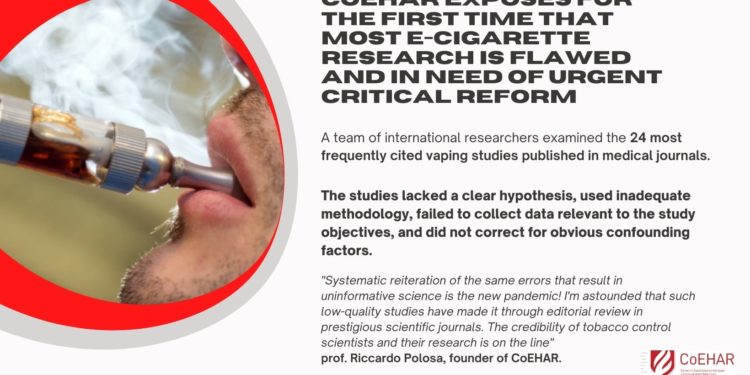Data that comes from international scientific studies are necessary to set the guidelines of public health policies.
Noting the misinformation in the vaping sector and considering that several international organizations, such as the WHO, do not accept the growing body of knowledge in the field of tobacco harm reduction, a team of international researchers, leaded by CoEHAR, decided to evaluate the most popular vaping studies publish in medical journals.
The results?
The findings are shocking: almost all of these studies were found to be methodologically flawed; they lacked a clear hypothesis, used inadequate methodology, failed to collect data relevant to the study objectives, and did not correct for obvious confounding factors.
The research paper titled “Analysis of common methodological flaws in e-cigarette epidemiology research,” published in Internal and Emergency Medicine, exposes the most common errors researchers have made when looking into the health impact of combustion-free nicotine delivery products.
Under the guidance of Dr. Cother Hajat of the United Arab Emirates University and prof. Riccardo Polosa, founder of the CoEHAR, the researchers of the study analyzed the 24 most popular vaping studies published in highly authoritative medical journals. The researchers noted a plethora of fatal flaws in these studies; they identified, categorized, and accurately analyzed each mistake.
The authors conclude that the most influential research on e-cigarette is of inadequate quality and insufficient to guide public health decision and they offer practical recommendation for improving research in this field.
“Most of the included studies utilized inappropriate study design and did not address the research question that they set out to answer. In our paper we offer practical recommendations that can massively improve the quality and rigor future research in the field of tobacco harm reduction” explains Dr. Hajat
“We are proud to announce the most comprehensive analysis of common methodological flaws in e‐cigarette research ever published!” add prof. Riccardo Polosa, founder fo the CoEHAR “We urge researchers, reviewers, scientific editors and policy makers from all over the world to read this paper and learn how to prevent propagation of common mistakes that generate distortion of scientific truth and perpetuates the burden of respiratory morbidity and mortality caused by tobacco smoking. Systematic reiteration of the same errors that result in uninformative science is the new pandemic! I’m astounded that such low-quality studies have made it through editorial review in prestigious scientific journals. Vaping research is in need of urgent critical reform!“






